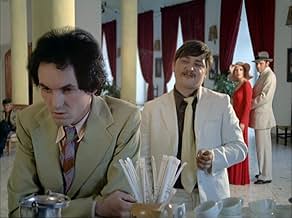Aggiungi una trama nella tua linguaOn a film set there are two things missing, the film material and the director. So the actors and actresses as well as the crew try to make the best out of the situation. When the director a... Leggi tuttoOn a film set there are two things missing, the film material and the director. So the actors and actresses as well as the crew try to make the best out of the situation. When the director arrives the material is still missing and so they still wait and try to make the best out o... Leggi tuttoOn a film set there are two things missing, the film material and the director. So the actors and actresses as well as the crew try to make the best out of the situation. When the director arrives the material is still missing and so they still wait and try to make the best out of the situation. When the material finally arrives all folks involved into the film find t... Leggi tutto
- Regia
- Sceneggiatura
- Star
- Eddie
- (as Eddi Constantine)
- Babs, Produktionssekretärin
- (as Margarete von Trotta)
- Billi, Maskenbildnerin
- (as Monika Teuber)
- Mike, Kameramann
- (as Gianni di Luigi)
- Deiters, Fotograf
- (as Werner Schröter)
- Oberbeleuchter
- (as Rudolf-Waldemar Brem)
Recensioni in evidenza
In a world divided between capitalist tyranny and socialist hypocrisy, there is no real place for Fassbinder and his troupe, representative of a generation that wants to be above bourgeois values, but finds no alternatives, falling into nihilism and depression.
In retrospect, we can believe that Fassbinder's discomfort stemmed, in large part, from the rejection of homosexuality, whether by fascist moralism or socialist progressivism. The sexual freedom of the sixties did not yet include homosexuality, and Fassbinder, using shock therapy in his films, was one of the staunchest critics of this hypocritical sexual revolution.
The film tells the story of a film production, which takes place in a haphazard manner, in a Sorrento painted in Francoist Spain, as a metaphor for a society and a revolution of mentalities, which is also slow to happen.
Meanwhile, Cuba Libres are drunk, in honor of the revolution.
You might enjoy it more if you understand a few things I noticed about it: 1) No one really pointed out how autobiographical it is...to an extreme. Since Fassbinder is using many of the friends he worked with in experimental theatre, they are essentially all playing each other, and obviously enjoying it. This makes the movie essential for Fassbinder fans. 2) There's Eddie Constantine, so this, technically, is Fassbinder's contribution to the Lemmy Caution series, much as Godard did with "Alphaville". 3) Another cinephile noted the reference to "Last Year at Marienbad"; the entire broken style of the end of the film seems to me a gentle mocking of all the Nouvelle Roman and experimental film coming out of Europe at the end of the 1960s. 4) This makes an interesting comparison not just with "Day for Night", but also "The State of Things", Wim Wenders film-within-a-film. I've also seen this film called boring, and it certainly could be seen as such; making movies IS boring. Fassbinder's interpretation is actually racing along compared to Wenders', but Wenders always has his exquisite cinematography to fall back upon. If you call it "boring", it is only because you've failed to accommodate the intent of the film. If it was trying to tell an exciting story, yeah, you would see it as a failure. But as a character study of a film company on location (I believe they were actually filming "Whity" at the same time in Ischia), this is relatively quick, to the point (less!) and a great opportunity to see how the earliest Fassbinder envisioned his own early success.
I love that Ulli Lommel appears as Korbinian, the manager. At this point, Lommel might have been a respected actor, but now (2016) he is better known for directing pure rubbish. He clearly did not pick up skills from Fassbinder.
The idea of the "meta" film is always fun, and I like the idea that the film is or isn't working because of shortcomings. But this really isn't my favorite Fassbinder. I like when he goes for that "Sirk touch", and that is noticeably absent here.
Lo sapevi?
- QuizAmong Bob Dylan's favorite films
- Citazioni
Journalist: What kind of movie is it?
Jeff, Regisseur: It's a film about brutality. What else would one make a movie about?
- Curiosità sui creditiThe film begins with the line: 'Hochmut kommt vor dem Fall.' ("Pride goeth before a Fall")
- ConnessioniFeatured in Rainer Werner Fassbinder, 1977 (1977)
- Colonne sonoreLet's Go Get Stoned
Written and Performed by Ray Charles
I più visti
- How long is Beware of a Holy Whore?Powered by Alexa
Dettagli
- Data di uscita
- Paesi di origine
- Lingue
- Celebre anche come
- Beware of a Holy Whore
- Luoghi delle riprese
- Hotel Bellevue Syrene, Sorrento, Napoli, Campania, Italia(Terraces, interiors)
- Aziende produttrici
- Vedi altri crediti dell’azienda su IMDbPro
Botteghino
- Budget
- 1.100.000 DEM (previsto)
- Lordo Stati Uniti e Canada
- 8144 USD
- Fine settimana di apertura Stati Uniti e Canada
- 11.623 USD
- 16 feb 2003
- Lordo in tutto il mondo
- 9115 USD
- Tempo di esecuzione
- 1h 43min(103 min)
- Mix di suoni
- Proporzioni
- 1.37 : 1






















